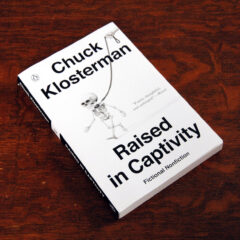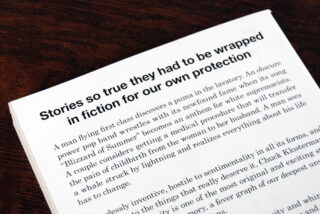
Chuck Klosterman is a master of the absurd in the simplest way. He’s truly outdone himself in “Raised in Captivity,” a book full of short stories that read like longer versions of his HYPERtheticals, which are questions intended to start insane conversations.
The front cover boasts this book as “Fictional Nonfiction,” but you could easily argue about what order that should be in or even about what each of these short stories are about. That’s what this book does. And it will get you thinking.
Is this a book for you? That’s a valid question. I was a fan of Klosterman before HYPERtheticals existed, and so for me, the description of a collection of stories similar to if HYPERtheticals grew into essays and short stories, is something that appeals to me on the whole.
If that doesn’t move you, these are highly realistic and often absurd circumstances that may or may not have a satisfactory ending. Much like a song, the way each story will individually hit you may have as much to do with the story as it does with your mindset and mood at the time you read it.
On my first read, Toxic Actuality, The Truth about Food, Rhinoceros, and Just Asking Questions, were some of my favorite titles. Overall, this book has 34 titles in it, and I could easily make that list of favorites more fluid the next time I pick up this book. Trust me when I say I’m sure there will be a next time.
 Is this book a collection of fever dreams? I hope not, because Klosterman would have to be tripping out of his mind or very sick to have that many fever dreams, but it does feel like an apt description.
Is this book a collection of fever dreams? I hope not, because Klosterman would have to be tripping out of his mind or very sick to have that many fever dreams, but it does feel like an apt description.
This feels like the kind of book that, if you find it in your library, everyone should pick up and just read one of the stories at random. If you enjoy what you read, take it out of the library or get yourself a copy at a local bookstore. Heck, if you see it in your local bookstore, these aren’t long short stories, sample one.
If you enjoy whatever you choose to sample then this is probably a book you’ll enjoy, but this may not be the best book to just blindly suggest for everyone, because I don’t think it is. But for people who enjoy talking for the sake of talking, and for those who enjoy a bit of a conundrum, this book may just be right up your alley.
To use one of the many quotable lines from the book in the hopes of selling it… “What else can I tell you, friendo? It’s an unscripted play, to the benefit of no one.”